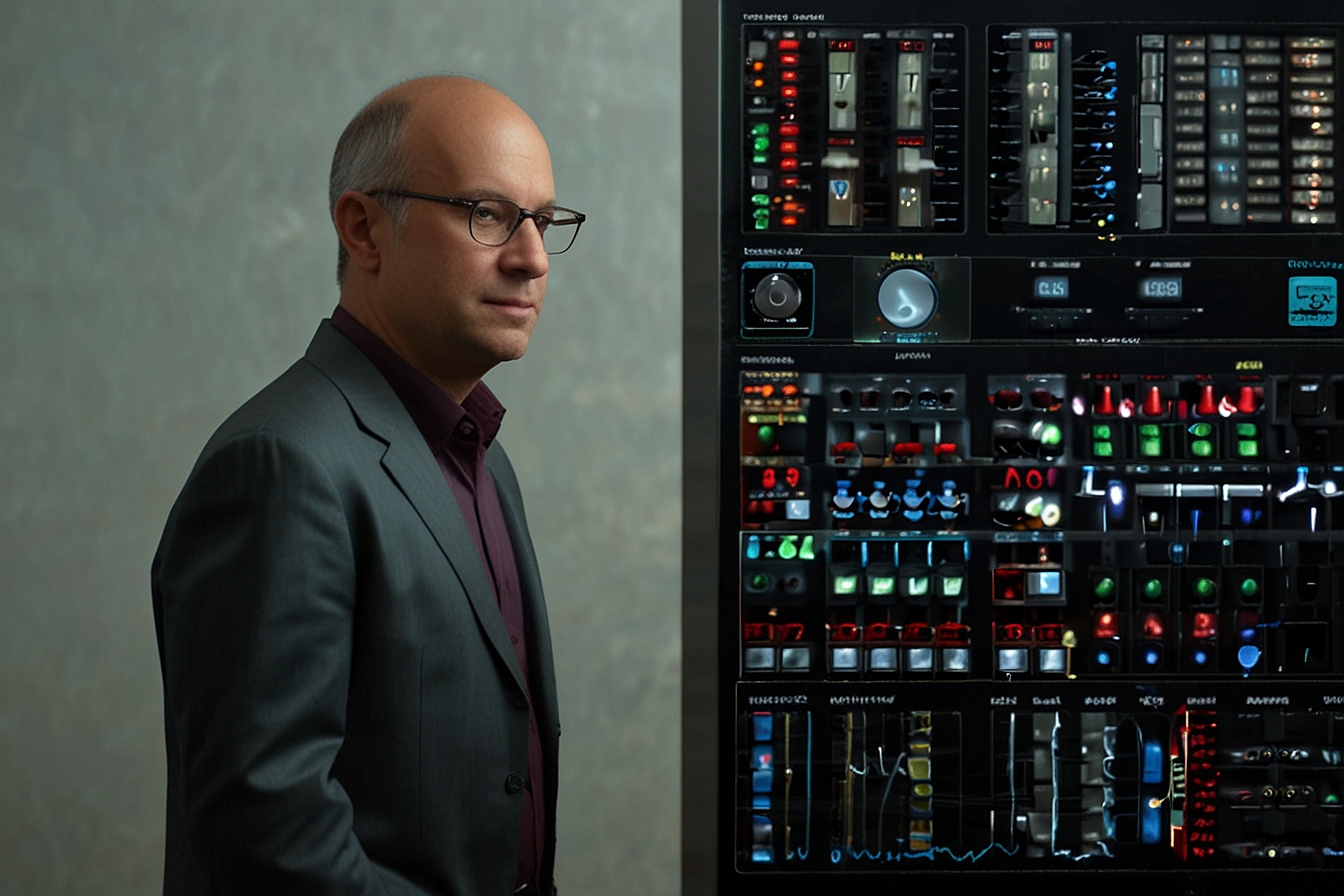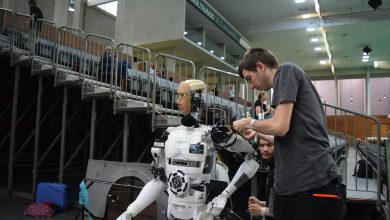The Impact Of AI In Healthcare

Table of Contents
- 1 AI-powered Diagnostics
- 2 Personalized Medicine
- 3 AI in Survey
- 4 Administrative Efficiency
- 5 Drug Discovery and Development
- 6 Remote Monitoring and Telemedicine
- 7 Ethical and Regulatory Challenges
- 8 Data Privacy and Security
- 9 Workforce Implications
- 10 AI in Global Health
- 11 Future Prospects of AI in Healthcare
- 12 Conclusion
Imagine a world in which medical professionals have access to highly intelligent companions to help them identify treatments for illnesses. Artificial intelligence (AI) has huge promise in the medical field. It is like having an outstanding physician who is unlimited and able to examine far more data than a human could. The technology known as artificial intelligence is changing healthcare and sickness prevention through drug development and improved decision-making for medical professionals. However, things aren’t perfect. Maintaining the security of our health information and ensuring that AI treats everyone equally are two difficult concerns. Discover the ways that artificial intelligence is transforming healthcare and expanding the field of medical study.
The Evolution of AI in HealthCare
AI hasn’t always been a medical miracle worker. In the past, paperwork and math calculations were the main uses of computers. Yet they become wiser with time. By examining a patient’s symptoms, artificial intelligence (AI) began assisting physicians in diagnosing conditions in the 1970s. It was similar to having a really intelligent helper!
AI in healthcare continued to advance along with computers. AI was first used by medical professionals to identify trends in patient data, leading to the development of novel therapies and medications. Then the great leap occurred: artificial intelligence began to aid in surgeries! AI-powered robots with extremely sophisticated minds started helping surgeons in the operating room, improving accuracy and safety.
AI is now pervasive in the medical field. It resembles a group of little assistants helping patients feel better by working nonstop. AI is altering the medical landscape by providing clinicians with powerful tools to combat diseases, from personalized treatment plans to the discovery of novel medications. Our progress has been just astounding!
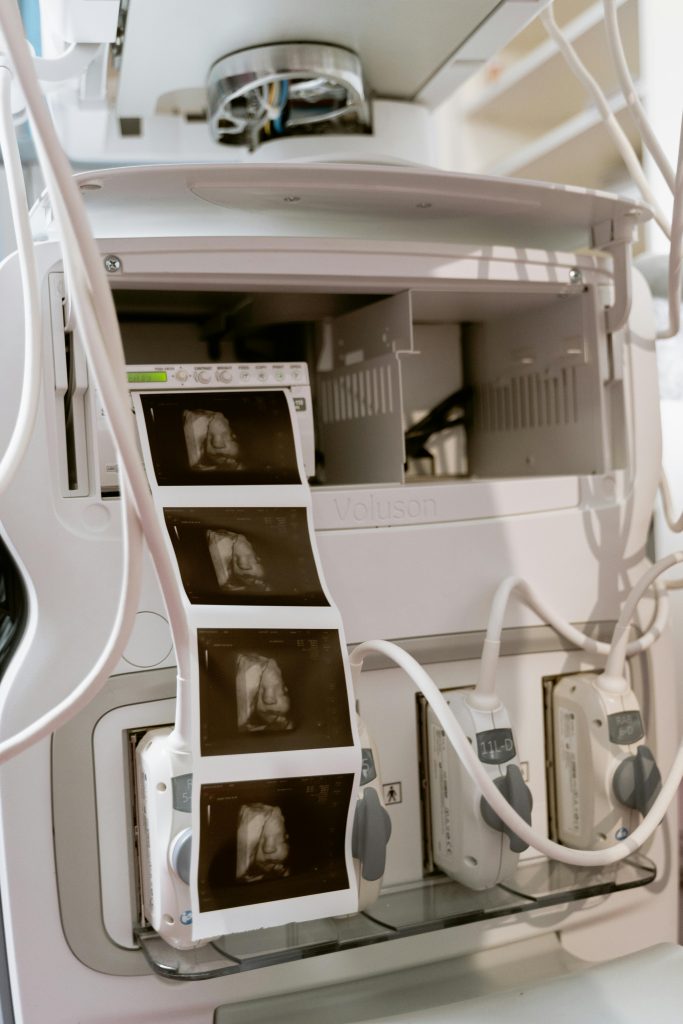
Photo by MART PRODUCTION from Pexels: https://www.pexels.com/photo/technology-computer-health-medical-7089021/
AI-powered Diagnostics
AI is similar to an extremely intelligent physician who can identify issues before they arise! Think of X-rays as detectives in waiting. That’s what hospitals are using AI for. It can detect microscopic details in scans, such as MRIs and X-rays, that even highly skilled medical professionals could overlook. It is far superior to having a second pair of eyes!
AI is also improving physicians’ understanding of diseases. AI can identify trends and understand the functioning of diseases by analyzing vast amounts of patient data. This aids researchers in developing novel medications and therapies. It’s like having a highly intelligent researcher searching for a cure all the time!
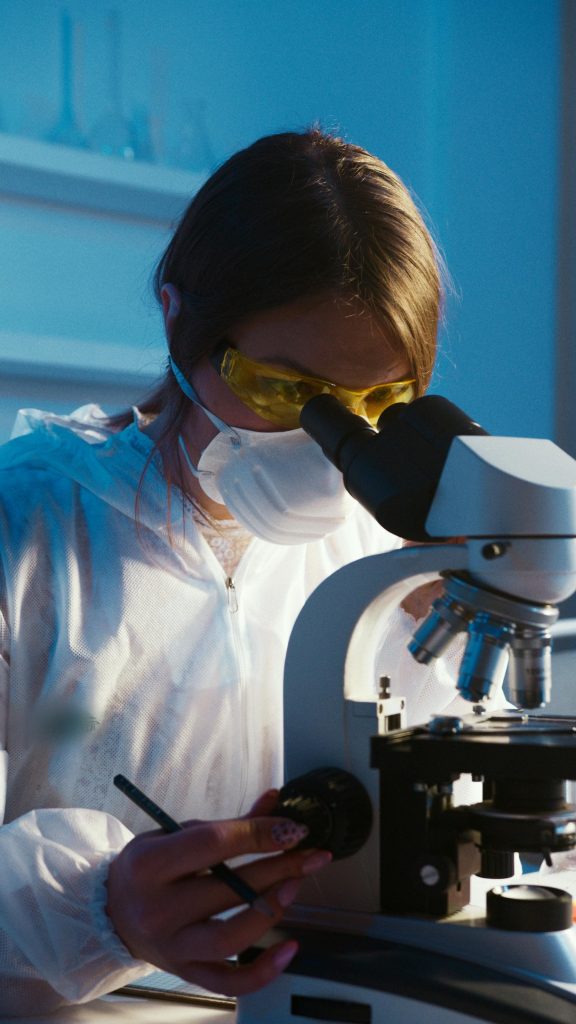
Photo by Artem Podrez: https://www.pexels.com/photo/photo-of-woman-looking-through-microscope-5726706/
Personalized Medicine
Imagine being treated by a doctor who is as knowledgeable about your body as a super-smart superhero. AI is enabling individualized medicine, which is centered around this idea! Physicians can now utilize AI to examine your individual body and DNA rather than prescribing the same medication to everyone. It’s like having a personalized treatment plan created just for you!
To determine the best course of action for you, AI can examine your lifestyle, medical history, and DNA. It’s like having a little researcher searching for the ideal medication inside your body. Better outcomes and fewer side effects are the result of this. This is healthcare’s future, and it’s really fantastic!

Photo by Karolina Kaboompics: https://www.pexels.com/photo/person-holding-a-vaccine-4047186/
AI in Survey
AI is also incredibly intelligent when it comes to taking surveys! Imagine answering questions via a survey that can comprehend your responses and even learn from them. That’s what artificial intelligence does! It can significantly increase the usefulness and interest of surveys. AI can ask you more questions in response to what you say, rather than merely selecting responses from a list. It’s similar to speaking with a very intelligent friend in person.
Furthermore, AI is capable of examining every response and identifying trends that people would overlook. It’s comparable to having a data-driven detective with the ability to unravel mysteries. This makes it easier for medical professionals and scientists to comprehend issues like patient attitudes about new medications and the kind of treatment that patients require. The progress AI is making is really amazing, smarter and more beneficial surveys!
Administrative Efficiency
AI is similar to a hospital’s extremely well-organized office manager! Doctors and nurses may spend more time with patients as it handles all the tedious paperwork and number crunching. Just picture appointment-taking robots that can also order supplies and complete insurance forms. AI is achieving that! It’s similar to having an assiduous group of workers who never weary or make mistakes.
AI is also assisting hospitals in making better decisions. With the use of a large amount of data, it can determine how best to use resources like beds and medication. Like having a crystal ball that can see into the future and tell what the hospital needs. Doctors and nurses may concentrate on their work because AI will take care of the tedious tasks.

Photo by Thirdman from Pexels: https://www.pexels.com/photo/man-in-white-long-sleeve-shirt-wearing-face-mask-sitting-on-black-chair-7652346/
Drug Discovery and Development
AI is assisting in the development of incredible new medications, much like a super-smart scientist! It’s like trying to find a needle in a haystack when it comes to finding new drugs, but AI is making it a lot easier. It is capable of analyzing millions of different compounds to identify potential medicinal candidates. It’s similar to having an extremely quick lab assistant that never tires!
Furthermore, AI can forecast a new drug’s potential effectiveness as well as any potential negative effects. It resembles possessing a crystal ball with the ability to glimpse into the future of medicine. As a result, people will start feeling better sooner and we will be able to identify remedies for illnesses much faster. The fact that AI is saving lives is really amazing!
Remote Monitoring and Telemedicine
AI is like a very intelligent nurse keeping an eye on you from a distance! Imagine having a little robot doctor that visits your house every day to monitor your health. AI uses remote monitoring to accomplish that. It tracks your blood pressure, pulse rate, and even your sleep using smartwatches and health trackers, among other amazing devices. It is like owning a personal health assistant!
That’s not all, though. With all that data at its disposal, AI can identify issues before they become too serious. It’s like possessing an extremely powerful crystal ball that can foretell when you might become ill. This implies that medical professionals can intervene and provide assistance even before you experience symptoms. Additionally, having remote monitoring reduces the frequency of hospital visits, which is fantastic for those with busy schedules and those who reside distant from medical professionals. It’s similar to bringing the doctor’s office into your living room!
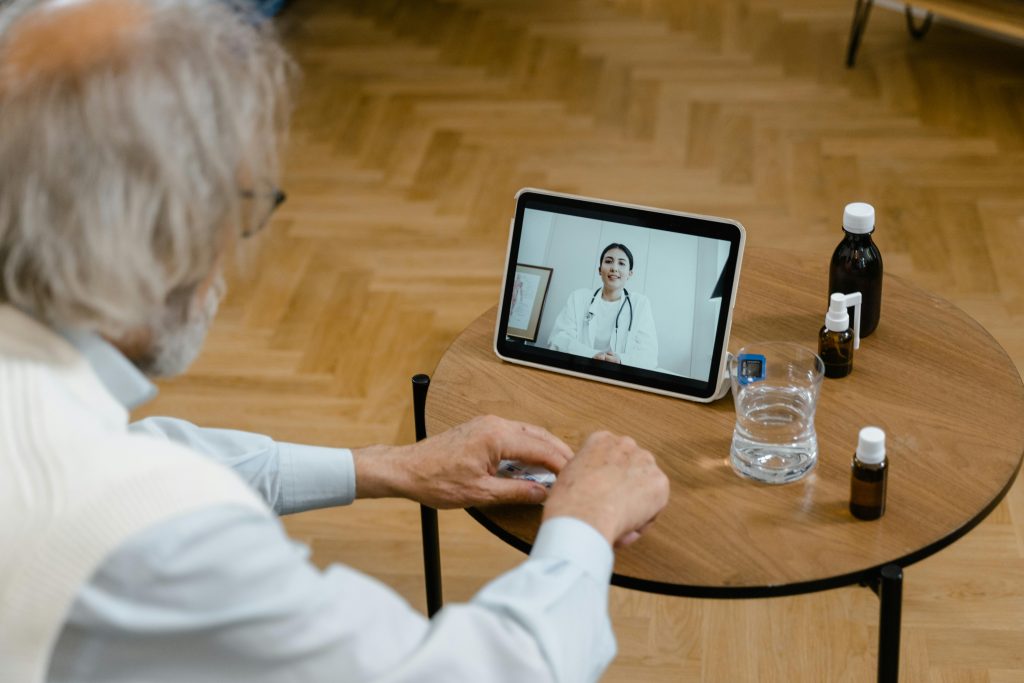
Photo by Tima Miroshnichenko: https://www.pexels.com/photo/a-doctor-doing-an-online-consultation-8376177/
Ethical and Regulatory Challenges
Although AI in healthcare is really exciting, there are some difficult issues to be resolved. AI can save lives for medical professionals, but we must utilize it carefully. Who is the owner, for instance, of the data that AI needs to learn? And what happens if the AI is wrong? That might be quite the issue!
Fairness is another important consideration. Not just the wealthy should benefit from AI. Robots making decisions that are unjust to particular people is something we do not desire. Not to mention the importance of jobs. Certain jobs may disappear as AI advances. Thus, we must consider the best ways to assist individuals in acquiring new skills and locating employment. Like piecing together a large puzzle with lots of pieces!
Data Privacy and Security
Safeguarding the privacy of your medical records is crucial! For AI to be intelligent, vast amounts of data are required, but those data also contain personal information about you. Think of your private information, including medical data, becoming publicly available online! For this reason, it is crucial to protect the privacy of your medical records. Your information must be safeguarded from hackers and accessible only to the appropriate parties. It’s similar to keeping your health secrets behind a very powerful lock.
However, maintaining secrecy is not the only goal. Furthermore, we must use the data fairly. Artificial intelligence (AI) shouldn’t make things worse for certain people; everyone should have equal access to quality healthcare. Like ensuring that everyone has an equal chance at being healthy Thus, even while AI is incredibly useful, we must exercise caution and ensure that we use it in a way that keeps everyone safe.
Workforce Implications
AI is transforming healthcare and nursing! Doctors can now spend more time with patients rather than on paperwork thanks to AI. Consider having a robot assistant do tedious tasks like drafting reports and setting up appointments. AI is achieving that! It’s similar to having an extremely quick and industrious assistant.
However, documentation is not the only issue. AI is also facilitating medical professionals’ learning. It can identify trends in medical data that people might overlook, which could result in novel findings and improved therapies. It has similarities to having a very intelligent and dedicated instructor who is always willing to help. Like everything else, though, AI may cause some employment to shift or even disappear. Thus, acquiring new knowledge is a crucial ability and keeping yourself current with technologies. It’s similar to picking up a new superpower!
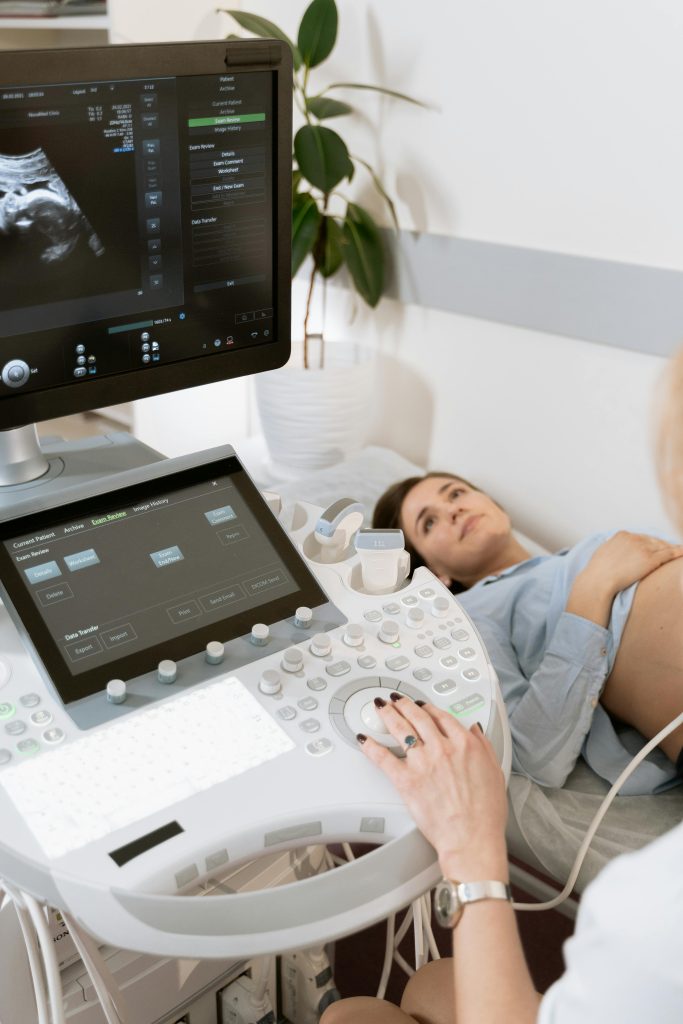
Photo by MART PRODUCTION: https://www.pexels.com/photo/photo-of-ob-gyn-doing-a-test-7088841/
AI in Global Health
Artificial Intelligence is like a superhuman physician providing global healthcare! It can assist those without access to quality healthcare by reaching locations that are inaccessible to actual doctors. Consider employing AI to train medical professionals in distant nations how to perform robotic surgery or to identify disease outbreaks before they become too severe. It’s similar to having a group of really intelligent aides battling disease all around them.
AI is also useful for food and clean water. AI can identify issues and recommend solutions by analyzing large amounts of data. It’s similar to having an extremely intelligent detective who can crack the greatest health secrets in the world. Thus, although AI is benefiting people in wealthy nations, it is also an effective tool for bringing about universal health in the world.
Future Prospects of AI in Healthcare
AI’s potential for the healthcare industry is really exciting! Imagine a scenario in which robot assistants for doctors are even more intelligent than they are. That is our future, according to AI. Hospitals that can anticipate when you could become ill, customized medications, and tiny robots doing surgery are all possibilities. It’s comparable to owning a health crystal ball!
It’s not all about fancy technology, though. AI can also assist us in discovering treatments for illnesses that are currently unimaginable. Like having a very intelligent scientist working around the clock to save lives. AI also allows us to reach a larger population, even in areas with a shortage of doctors. It’s similar to providing healthcare to everyone on the planet!
Naturally, there is still work to be done to come to terms with, such as ensuring that AI treats everyone fairly and protecting our personal data. But the future of healthcare seems really promising if we use AI intelligently!

Photo by RF._.studio: https://www.pexels.com/photo/photo-of-women-at-the-meeting-3810792/
Conclusion
AI has incredible potential to change healthcare! Our health is being improved around the clock by a super-smart staff that works on everything from developing new medications to assisting physicians in making better judgments. But keep in mind that artificial intelligence is merely a tool. To use this knowledge to benefit patients, real doctors and nurses are still required. It’s like having access to a super powerful microscope that allows us to see things we couldn’t see before.
Artificial intelligence has a very interesting future in healthcare! Not too distant from the future: hospitals that anticipate patient illness, customized medications, and surgical robots. However, caution must be exercised when using AI, and equal opportunity must be ensured for all. Planning ahead and working diligently will enable us to build AI-enabled medical care delivery in the future that improves global health and saves lives.
Stay up to date on the newest advances in artificial intelligence and healthcare. Subscribe to our newsletter to receive updates and insights into how AI is influencing the future of medicine.

